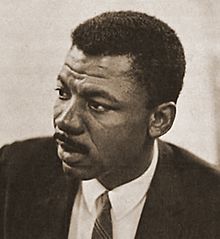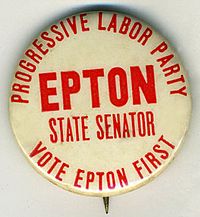Bill Epton facts for kids
William Leo Epton Jr. (born January 17, 1932 – died January 23, 2002) was an African-American activist. He believed in communist ideas, which focus on shared ownership and equality. He was a leader in the Progressive Labor Party until around 1970.
Epton was the first person found guilty of "criminal anarchy" since 1919. This charge was about speaking out against the government in a way that could cause public disorder.
Contents
Early Life and Activism
William Epton Jr. was born in Harlem, New New York City. Even when he was young, he was a strong voice for change. In high school, he supported civil rights and helped organize workers' unions.
He served in the Army during the Korean War. After his military service, he became an electrician. He then became involved with the Progressive Labor Movement, which was a political group.
The Harlem Protests of 1964
In July 1964, a 15-year-old African-American student named James Powell was shot and killed by a NYPD officer. This event led to many days of protests in Harlem. These protests grew into street violence.
Epton and the Progressive Labor Party put up posters that said "Wanted For Murder – Gilligan the Cop." This was about the officer involved in the shooting. The city then declared a state of emergency, which meant public protests were not allowed.
Most other leaders followed this ban. However, Epton and his group in Harlem called for a peaceful rally. It was planned for July 25 on 125th Street. When they started to march, Epton was arrested.
He was charged with "criminal anarchy" because of his speeches. He was found guilty and sentenced to one year in prison. His trial was delayed until August 2, 1965. Newspapers at the time discussed the protests as a demand for equal rights by a minority group.
Epton's Powerful Speech
Bill Epton wrote a strong speech for his sentencing hearing. The Progressive Labor Party later published it as a pamphlet in 1966. In his speech, he said:
You didn't have to have a trial to "prove" these things. All you had to do was ask me and I would have told you – Yes! There's no problem – There's no secret – whatever we write and publish we sign with our name, address and phone number. We are willing and not afraid to put out ideas in the public view. ... Did you, at any time, think that we would deny what we do and have done? Did you think that we would deny what we hold to be true and what we believe in? Do you think that all people in this country have been so "brain dirtied" and have been so thoroughly corrupted that they are afraid to express an independent thought – to stand up for what they believe and fight for it? Well, there are people in this country who are governed by ideas that do not come out of the pages of the Times and the Daily News, and their numbers grow every day. And I am sure that this so-called "trial" has opened up many more eyes. Whatever we do and whatever we believe in – we do and believe that it is in the interest of the people of this country; And yes – we are proud to have done it and to be doing it and we stand behind our actions four-square!
A grand jury accused Mr. Epton of making speeches that kept the 1964 protests going. In one speech, which was secretly recorded, he spoke about fighting against those in power.
Later Life and Legacy
Epton was released on bail while he appealed his conviction. During this time, the Progressive Labor Party changed some of its political views. Epton disagreed with these changes and eventually left the party.
After leaving, he worked to bring together other revolutionary thinkers in the U.S. in the early 1970s. His appeal was eventually denied, and he served the rest of his prison sentence.
However, just two years after Epton was imprisoned, the type of activism he engaged in was ruled to be constitutional. A lawyer named Leon Friedman noted that if the new rules had been in place, Epton likely would have won his case.
Epton helped start the A. Philip Randolph Labor Council. He also worked as an information officer and printer for the New York City Board of Education. He passed away in 2002 in his hometown of Harlem. He was survived by his two children and three grandchildren.
 | Selma Burke |
 | Pauline Powell Burns |
 | Frederick J. Brown |
 | Robert Blackburn |



